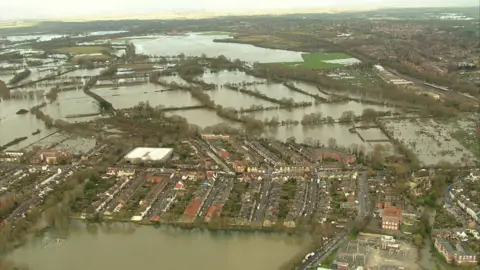Flood victims future-proof their homes
 BBC
BBCResidents in Oxford are flood-proofing their homes as climate change threatens to bring heavier rain and more extreme weather in the future.
Some residents recall that 2007 was the worst year for flooding, when many of them had to move out of their homes.
One business owner, who could not get buildings insurance, turned the ground floor of their building in to a flood plain so water could flow freely inside and out.
Despite the changes many people have had to made to their houses they still get anxious every time it rains.

Simon Collings, who lives on Osney Island in West Oxford, said 2007 was the worst year for flooding.
"Dealing with the aftermath of a flood, particularly if it's been widespread across the country, is very difficult because insurers are under pressure and loss adjusters are under pressure," he said.
Mr Collings said he learnt a lot from his experience and now has a flood plan for when the water levels rise.

Where he lives properties are mainly affected by ground water flooding, water comes up from underneath the floor boards.
When water levels are high in the surrounding rivers, he moves furniture upstairs, puts his washing machine and dishwasher on wooden pallets and drops a submersible pump in to the void underneath his flood boards.
Water is then pumped out of the window via a hose and runs out on to the street.
Flood gates are put on the downstairs front and back doors and he then blocks the air bricks at the front of the house.
 Simon Collings
Simon CollingsJacqui Mangold owns a yoga studio on Osney Island and is unable to get flood insurance.
Because of that they designed the ground floor of the building to let water in and out.
Cupboards are raised on stilts, electric sockets are higher up and there are valves at either end of the building so the water can flow freely.

Ms Mangold said: "We haven't been flooded here, but we bought a building that was a commercial building, part of the planning constrictions was that the building allows water in.
"In a certain sense, we are the flood plain here."

Sasha Mlynek, a young mother who lives around the corner from Simon, said the water levels were always on her mind.
"Nothing really prepares you psychologically for what it's like to have to lift up your floorboards and see that your floor is completely flooded through and you're inches from flooding inside and it really scared us," she said.
"It would be wonderful if we could get granting to support to put in a permanent pump under floor.
"Climate change is meant that the amount of rain that falls, falls fast and there is a lot of it."

Richard Powell, chairman at the West Oxford Bowls Club, said they have spent £25,000 on repairs to the club house, caused by frequent flooding over the years.
"We get flooded quite regularly, the green gets about two foot of water on it," he said.
"We have all the people come together and try and put the club back together, if we get flooded."

Along with a number of other members he is currently damp proofing the walls to prevent further damage.
Mr Powell said: "Bitumen is painted on to the bottom of the building to hopefully stop the water from coming in."
 Richard Powell
Richard PowellRobbie Williams from the Environment Agency is the project director for the Oxford Flood Alleviation Scheme, something some residents believe will help the city in future years.
"This scheme is a nature based scheme that effectively captures all the flood water above Oxford," he said.
"It channels it naturally across the west side of Oxford. We're going to create a new stream and a wetland corridor.
"That will keep all the water left, west of Oxford, rather than in Oxford."

A number of residents aren't happy with the current scheme that is expected to be announced this Spring by the Department for Environment, Food & Rural Affairs (DEFRA).
Chris Sugden from the Hinksey and Osney Environmental Group said he is not against a scheme as such.
He said: "The channels that they are proposing to drive through beautiful, excellent meadows, which had been here thousands of years doing their job will be totally destructive of wildlife.
"Very rare grasslands cannot be compensated for and cost far too much."

You can follow BBC Oxfordshire on Facebook, X (Twitter), or Instagram.
